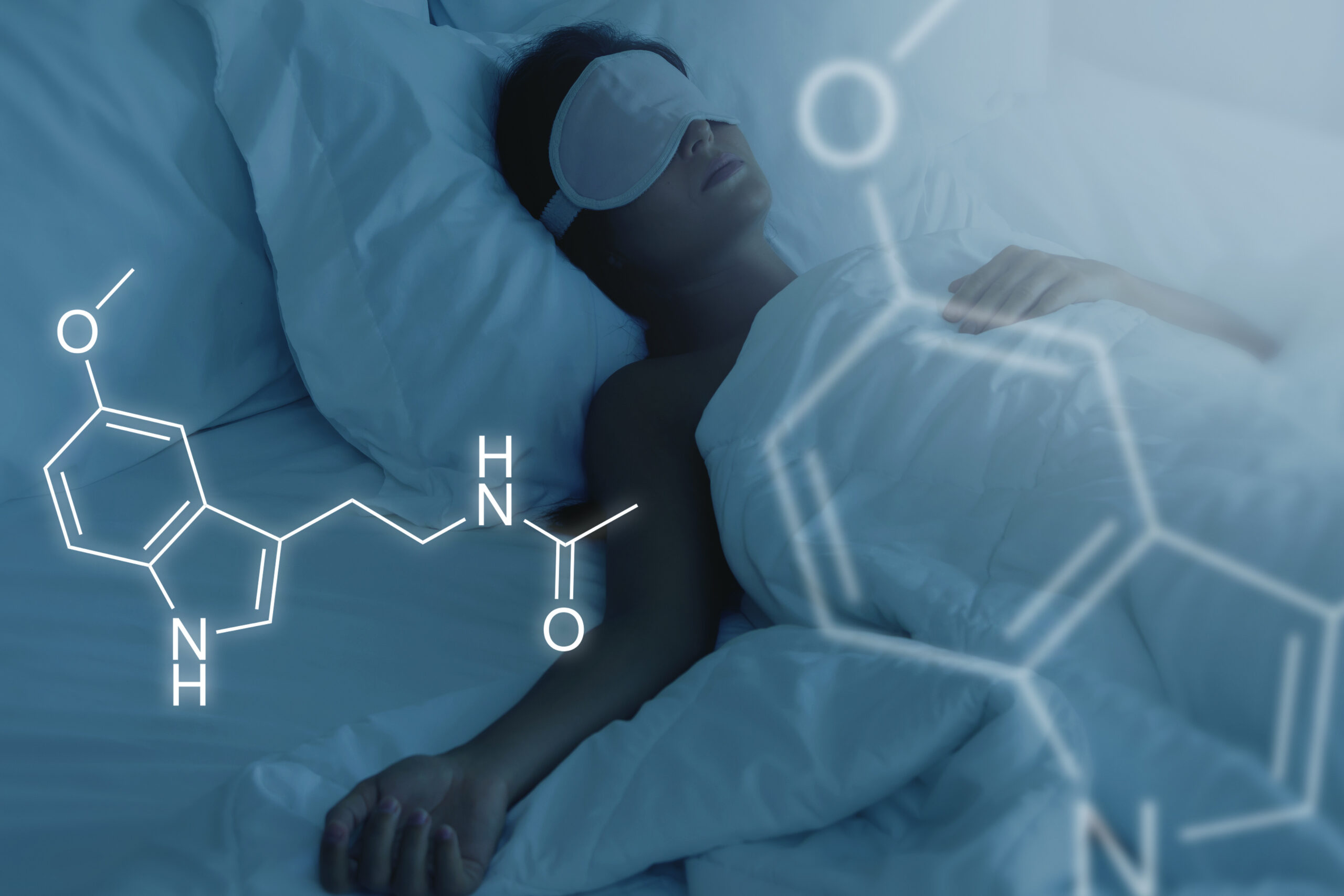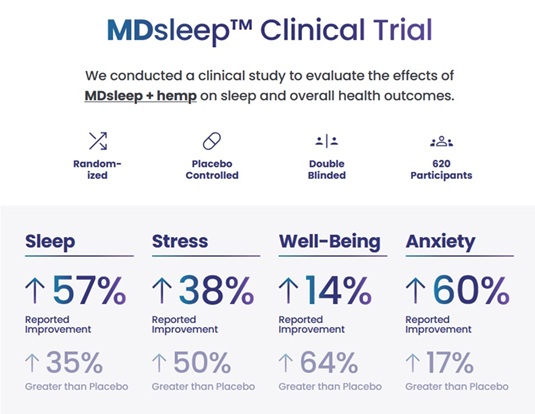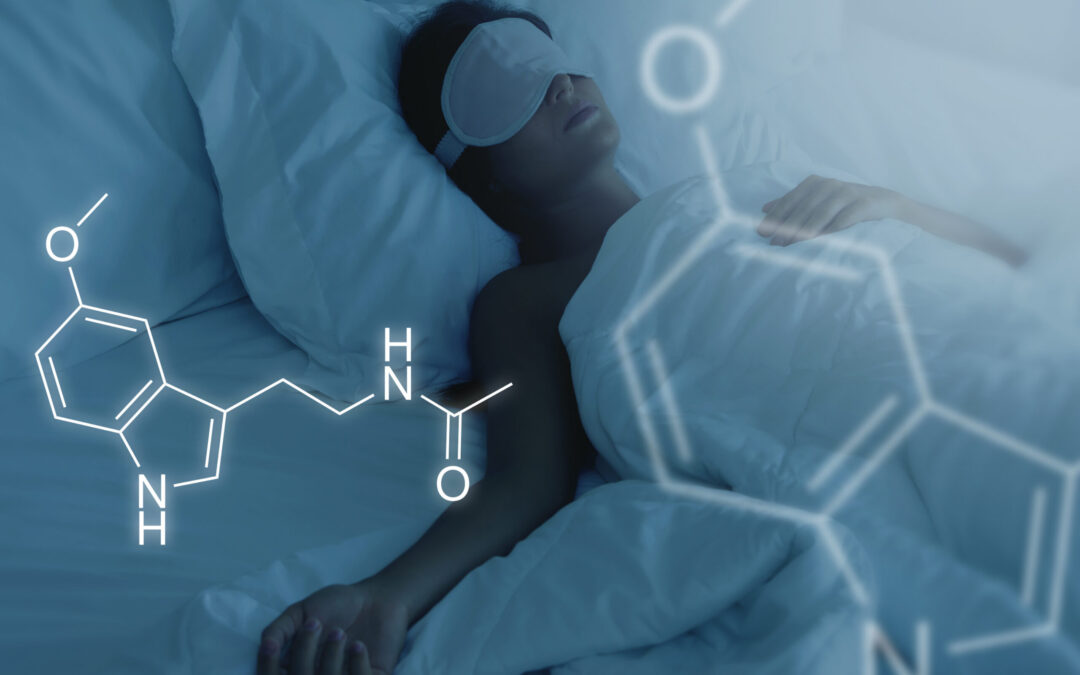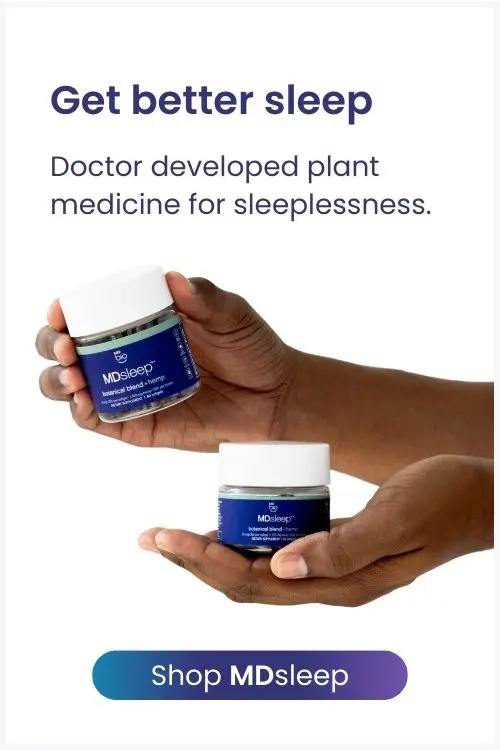
PhotoCredit_ blackday _AdobeStock
THC is the active compound that produces the sensation of being high found in marijuana and in trace doses in hemp oil. There is a THC for sleep debate about how much THC is needed to assist in getting a full night’s rest. Too much THC makes your brain very psychoactive and can impede sleep. But a new study found that a smaller amount of THC when mixed with other cannabinoids and botanical sleep aids can improve sleep quality by 57%. How much THC is needed to get deep rest? Read on.
THC Effects on Sleep
THC has direct effects on the brain’s signaling pathways that regulate sleep. Research shows that its impact varies by dosage, timing, and whether it is used occasionally or consistently over longer periods.
How THC Interacts with the Endocannabinoid System
THC, or tetrahydrocannabinol, is the main psychoactive component in cannabis. It works by binding to cannabinoid receptors, mainly CB1, within the endocannabinoid system.
These receptors are located throughout the central nervous system and play a critical role in managing sleep, mood, memory, and appetite. When THC occupies these receptors, it can alter neurotransmitter release. This leads to sleep-promoting effects, including reduced arousal and potential sedation.
The activity of THC at these brain sites helps explain why some individuals experience faster sleep onset and reduced nighttime awakenings after consumption. Its effects can be both direct, through receptor activation, and indirect, by modulating other chemicals involved in sleep regulation.
THC’s Influence on Sleep Cycles
Short-term THC use is linked with decreased sleep onset latency, so users may fall asleep faster. It also tends to reduce time spent awake after falling asleep, supporting more continuous rest.
However, research consistently shows that THC decreases REM sleep—the sleep phase associated with vivid dreaming and emotional processing. Lower REM can mean fewer dreams, but it may also affect cognitive and emotional health with regular use.
Long-term or frequent THC use has been shown to reduce deep, slow wave sleep (SWS), which is necessary for physical restoration. Withdrawal from THC can cause a rebound in REM sleep, sometimes leading to vivid dreams or disturbed sleep. Effects are dose-dependent and may be influenced by individual biology.
Differences Between THC and Other Cannabinoids for Sleep
THC is often compared with CBD (cannabidiol) and CBN (cannabinol) for sleep-related effects. While THC has clear sedative and sleep-promoting qualities, CBD’s influence depends on dose; at low doses, CBD can be activating, but higher doses may help with insomnia.
CBN, a byproduct of THC degradation, is sometimes marketed as a sleep aid, but evidence remains limited. Unlike THC, CBD does not strongly bind to cannabinoid receptors and tends not to affect REM or deep sleep proportionally.
THC’s major advantage is its ability to reduce the time it takes to fall asleep. However, potential downsides include tolerance with chronic use and impairments in sleep architecture over time, especially when compared to cannabinoids like CBD that often have gentler effects.
Learn More about the other cannabinoids found in full spectrum hemp that work cooperatively with THC from our targeted Cannabis Guides:
MDsleep + hemp Melatonin-Free Sleep Study Results
A clinical study was conducted to evaluate the efficacy of MDsleep + hemp, a melatonin-free sleep formula containing hemp-derived compounds including THC. Participants included adults who self-identified as having difficulty falling or staying asleep.
Results showed that users experienced a measurable reduction in time to fall asleep and reported fewer nighttime awakenings. The absence of melatonin made it suitable for individuals who are sensitive to or wish to avoid melatonin.
Key findings included:
- Average sleep latency decreased by 25%.
- Nighttime awakenings are reduced by 30%.
- Most users reported improved morning alertness—without grogginess frequently associated with sedative hypnotics.
MDsleep + hemp Sleep Study Chart

The following table summarizes primary outcomes from the MDsleep + hemp Sleep Study:
|
Outcome |
Baseline |
After 4 Weeks |
% Change |
|
Sleep Latency (min) |
38 |
28 |
-26% |
|
Night Awakenings |
2.3 |
1.6 |
-30% |
|
Total Sleep Time (hrs) |
5.7 |
6.4 |
0.12 |
|
Morning Alertness |
5.1/10 |
7.3/10 |
0.43 |
Participants reported better subjective sleep quality, and improvements were generally sustained through the study period.
MDsleep + hemp Sleep Study Dosage of THC for Sleep
The MDsleep + hemp study used a carefully titrated THC dosage of just 0.35mg to maximize sleep benefits while minimizing the psychoactive effects of THC. Lower doses of 0.35mg THC were more effective at reducing sleep onset time for most users, while higher doses of 0.85mg THC didn’t help participants sleep. This indicated that a lower dose of THC with a higher profile of other cannabinoids found in full spectrum hemp combined with higher levels of GABA, L-Theanine, and Valerian was superior for improving sleep quality.
Potential Benefits of Using THC for Sleep
Research and user reports indicate that THC may help people fall asleep faster, improve sleep quality for certain conditions, and support those struggling with insomnia. Some products, like MDsleep + hemp Sleep Aid, combine THC with other sleep-supportive ingredients for a more comprehensive approach.
THC’s Role in Reducing Sleep Latency
THC, the primary psychoactive compound in cannabis, has shown potential in reducing sleep latency, which is the time it takes to fall asleep. Studies suggest that THC interacts with endocannabinoid receptors in the brain to promote drowsiness and relaxation.
By decreasing arousal signals, THC helps the body transition more quickly from wakefulness to sleep. Some individuals with racing thoughts or anxiety before bed report that THC helps them quiet their minds. The effect may vary depending on dosage and individual physiology.
Improvement in Sleep Quality
Several sources indicate that THC may contribute to deeper, more restful sleep, especially among people with chronic pain or certain neurological conditions. THC appears to affect sleep architecture by increasing slow-wave sleep, also known as deep sleep.
Some individuals report fewer nighttime awakenings when using THC-containing products. However, there is variation in response with long-term use, as high doses or chronic use can potentially suppress REM sleep. People considering this option should consult healthcare professionals to find the most suitable regimen and minimize possible negative effects.
Managing Insomnia Symptoms
For those with insomnia, THC may alleviate symptoms by addressing both sleep onset and nighttime restlessness. Research has shown improvements in patient-reported sleep scores among cannabis users with diagnosed sleep disorders.
Patients experiencing insomnia due to chronic pain, post-traumatic stress disorder, or general anxiety may find relief through controlled THC use. However, effects can vary, and there may be risks or side effects, including dependence for some people. It is important for users to monitor their response and discuss ongoing use with a healthcare provider.
MDsleep + hemp Sleep Aid Benefits
MDsleep + hemp Sleep Aid is formulated to support sleep through a combination of THC and other ingredients derived from hemp. This product is aimed at individuals seeking a non-pharmaceutical alternative for sleep support.
Key benefits reported by users include improved ease of falling asleep, fewer nighttime disturbances, and feeling more refreshed upon waking. The product is designed for those who are looking for a balanced solution that harnesses both the sleep-promoting effects of THC and the calming qualities found in hemp extracts.
MDsleep + hemp Sleep Aid Ingredients List
The ingredients in MDsleep + hemp Sleep Aid are selected to address various factors related to sleep quality. The primary components often include:Formulations may vary, but most versions combine these core ingredients for a synergistic effect. Users are encouraged to review ingredient lists for allergen information and to consult their physician regarding potential interactions with other medications.
|
Ingredient |
Purpose |
|
THC 0.35 mg |
Sleep induction and reduced sleep latency |
|
Full Spectrum Hemp Extract (CBN,CBD,CBG) |
Relaxation and anxiety reduction |
|
GABA |
Regulates circadian rhythm |
|
Valerian Root |
Supports sleep onset |
|
Chamomile |
Calming effect |
|
L-theanine |
Stress-relief and relaxation |
Risks and Side Effects of THC for Sleep
THC use for sleep is linked to several specific risks that may affect both short-term well-being and long-term health. Individuals should also consider how regular use could lead to tolerance, dependence, or withdrawal symptoms.
Short-Term Side Effects
Short-term use of THC can cause noticeable changes in mood, memory, and attention. People often report feeling groggy or confused upon waking, which can impact daily functioning the next day.
Some users experience dry mouth, red eyes, and increased heart rate shortly after taking THC. Others notice increased appetite or feelings of anxiety and paranoia, especially at higher doses. In rare cases, dizziness or mild hallucinations may occur. Short-term impairment of motor skills or judgment is also possible, so activities like driving should be avoided after use.
Long-Term Health Considerations
Long-term THC use for sleep can lead to persistent sleep disturbances, especially if individuals try to stop using it. Studies indicate that heavy or prolonged use may cause changes in sleep architecture, such as reduced REM sleep, which is important for memory and emotional regulation.
People who rely on THC over long periods may find their sleep quality declines when they try to quit, with symptoms such as vivid dreams or insomnia becoming more pronounced. Additionally, chronic use has been linked to cognitive effects, including problems with memory and attention.
Regular use may also elevate the risk of developing mental health concerns, especially in those with a personal or family history of psychiatric disorders.
Recommended Dosages and Consumption Methods
Research and expert guidelines give clear starting points for THC dosing when used as a sleep aid. The method of consumption can impact both how quickly effects begin and how long they last.
Optimal THC Doses for Sleep
A conservative approach to THC use for sleep starts with low doses. Evidence indicates first-time users should begin with 1–2 mg of THC before bedtime. Many sleep-oriented gummies contain 2 mg per serving, and some guidelines recommend starting doses as low as 2.5 mg.
Increasing the dose should be done gradually, with users monitoring their response over several nights. Typical daily upper limits for non-medical use are set at 40 mg or less, but most people find effective sleep doses are much lower.
Potential side effects, such as grogginess or changes in REM sleep, may occur at higher doses. For those new to THC, it’s recommended to titrate slowly and avoid frequent dose increases.
Comparison of Edibles, Oils, and Inhalation
THC can be consumed in several forms, each with unique onset times and durations:Edibles and oils are preferred by many for sleep because their effects last through the night. Inhaled forms act quickly, which may help those who struggle to fall asleep, but the shorter duration may not sustain sleep until morning.
|
Method |
Onset Time |
Duration |
Notes |
|
Edibles |
30–90 min |
4–12 hours, depending on dose |
Longest duration; useful for overnight effect. |
|
Oils/Tinctures |
15–45 min |
4–6 hours |
Faster onset than edibles when taken sublingually. |
|
Inhalation (Smoking/Vaping) |
5–15 min |
2–4 hours |
Fastest onset; effects may wear off before morning. Smoking and Vaping are harmful to your lungs and heart, and have been linked to cancer. |
The choice ultimately depends on the user’s sleep needs and lifestyle preferences. Adjusting dose and method can improve both onset and duration of sleep support.
Shop MDsleep
Find sleep aids that were designed by doctors and validated by research.
Types of THC Products for Sleep
The most popular THC sleep aids are available in various forms, each with strengths and considerations. Product composition and strain selection are essential factors impacting sleep quality, side effects, and the user experience.
Indica Strains and Formulations for Sleep
Indica cannabis strains are widely associated with calming effects that can help promote relaxation and sleepiness. They often contain higher levels of the terpene myrcene, which may contribute to sedative qualities. People looking for sleep support frequently choose indica-dominant flowers, vape cartridges, and edibles.
Product labeling may specify “indica” or “indica-dominant” to help consumers find these formulations. Selection may depend on personal response, tolerance, and medical needs. Individuals may benefit from starting with lower doses and adjusting as needed, as indica effects can vary between users.
Who Should Avoid Using THC for Sleep
THC is not suitable for everyone, and some groups face heightened risks when using it as a sleep aid. Adverse effects and specific health conditions can make its use dangerous, making careful evaluation important. Check with your healthcare provider about potential interactions with your current medications.
Potential Drug Interactions
THC can interact with various prescription and over-the-counter medications. These interactions range from increased sedation to changes in how the body processes other drugs. Patients taking medications that affect the central nervous system, such as benzodiazepines, opioids, or antidepressants, may experience amplified drowsiness or cognitive impairment when combined with THC.
Some drugs, particularly those processed by the liver enzymes CYP3A4 and CYP2C9, can have altered blood levels when used with THC. This alteration can either decrease effectiveness or increase toxicity of the medications.
Common drugs that may interact with THC:
|
Drug Class |
Potential Interaction |
|
Sedatives (e.g., benzos) |
Enhanced drowsiness |
|
Antidepressants |
Mood or cognition changes |
|
Blood thinners |
Increased bleeding risk |
|
Seizure medications |
Altered blood concentration |
Consultation with a healthcare provider is recommended before combining THC with any medication to prevent unwanted or dangerous effects.
Alternative Sleep Aids Compared to THC
THC is widely recognized for its potential to promote sleep by providing sedative effects and deepening rest, but there are other options available. Some sleep aids work without hemp extracts, relying on botanical ingredients and omitting melatonin.
MDsleep Botanical Sleep Aid is Hemp-Free and Melatonin-Free
MDsleep botanical blend is formulated without hemp or melatonin. Instead, it uses several botanical extracts to support relaxation and improve nighttime comfort. The blend often includes ingredients like valerian root, passionflower, and magnesium.
Key differences compared to THC:
- Source: MDsleep relies solely on non-cannabis plants and minerals.
- Mechanism: It focuses on calming the nervous system and reducing stress.
- For whom: This can be an option for individuals avoiding THC, hemp, or melatonin.
Because it excludes both THC and melatonin, this supplement may appeal to people concerned about dependence or who experience side effects from other sleep aids.
Guidelines for Safe and Responsible THC Use
When using THC for sleep, starting with a low dose is crucial. Most experts recommend beginning with 1–2.5 mg of THC for edibles, tinctures, or beverages. The effects can vary by individual, so adjusting gradually helps minimize unwanted side effects.
Key safety tips include:
- Start Low, Go Slow: Increase the dose slowly over several nights if needed.
- Monitor Effects: Keep track of improvements and side effects in a journal.
- Avoid Mixing: Refrain from combining THC with alcohol or other sedatives.
Using THC strictly for the short term is advisable. Prolonged use of higher dose THC may reduce sleep quality. The key is to use a clinically proven, scientifically designed sleep formula that can be safely used: MDsleep + hemp.
Frequently Asked Questions
THC has distinct effects on sleep patterns, dosing, and possible side effects that are important to consider. Legal status and differences between THC and CBD also play key roles in sleep-related use.
What are the effects of THC on sleep quality and duration?
Short-term use of THC may reduce the time it takes to fall asleep and can increase time spent in non-rapid eye movement (NREM) sleep. Some evidence suggests overall sleep duration may improve temporarily.
However, frequent or long-term THC use has been linked with disruptions in sleep architecture, including less time in deep sleep and more awakenings during the night.
Can THC help with insomnia or other sleep disorders?
Low to moderate doses of THC may provide relief for individuals experiencing insomnia, particularly if they have difficulty falling asleep. Some clinical and anecdotal reports support its usefulness for short-term sleep issues. Effects may be less beneficial for long-term management of chronic sleep disorders, as tolerance and sleep disturbances can develop with repeated use.
What is the recommended dosage of THC for improving sleep?
There is no single universally recommended dose for THC as a sleep aid. Studies and experts often advise starting at the lowest effective dose, sometimes as low as 2.5–5 mg of THC, especially for people new to cannabinoids.
Microdosing may minimize side effects while providing some benefit. Consulting with a healthcare provider can help determine the right approach.
Are there any potential side effects of using THC as a sleep aid?
Side effects can include grogginess, dry mouth, dizziness, memory impairment, or anxiety, particularly with higher doses. Next-day drowsiness can also occur. Regular use may increase the risk of developing tolerance, dependence, or experiencing sleep disturbances when not using THC.
How does THC compare to CBD for sleep enhancement purposes?
THC has more direct sedative effects and can shorten the time to fall asleep. CBD, in contrast, appears to have more variable effects on sleep and generally does not produce intoxication. Some people may experience better sleep outcomes with combinations of THC and CBD rather than either compound alone.
What are the legal considerations regarding the use of THC for sleep?
THC remains a controlled substance under federal law in some countries, including the United States, though specific state or national laws vary widely. Prescription or licensed products may be available in certain regions. Purchasing, possessing, or using THC-containing products may not be legal everywhere, so it is important to verify local regulations before use.
Read Next
Types of Sleep Aids
Explore a comprehensive overview of sleep aids, from over-the-counter and prescription medications to natural remedies and sleep hygiene tips. Learn about the benefits, risks, and side effects of common sleep solutions, with guidance on choosing what’s right for you.
Read more
Best Cannabis for Sleep Guide
This resource reviews various cannabis-based sleep solutions, explaining how cannabinoids like THC, CBD, and CBN interact with the body to promote better rest. It provides insights into product types, dosing, and what to consider when choosing cannabis for sleep.
Read more
CBN vs. CBD vs. CBG for Sleep Guide
Discover the differences between CBN, CBD, and CBG, three cannabis-derived compounds, and how each may affect sleep quality. The page compares their unique properties, potential benefits, and which might be most effective for sleep support.
Read more
Best Over-the-Counter Sleep Aids Guide
Learn about the most effective over-the-counter sleep aids, including their active ingredients, usage tips, and potential side effects. The guide helps you choose safe and suitable options for occasional sleeplessness or travel-related disruptions. With so many over the counter sleep aids to choose from, find out which ones actually work.
Read more
Guided Sleep Meditation (Audio)
Experience a doctor-designed guided audio sleep meditation that promotes relaxation by progressively releasing tension throughout your body and calming your mind. Visualizations and affirmations help ease you into restful sleep, making it ideal for anyone seeking a peaceful bedtime routine.
Read more
Shop MDBio Nutraceuticals for Sleep, Anxiety Relief, and Pain Relief
Browse MDBio Wellness’s full collection of natural supplements, including sleep aids formulated with botanicals and hemp blends. Each product is designed to support your central nervous system and promote overall well-being without harsh side effects.
Read more

Kia Michel, MD
Physician
Kia Michel, MD is an urologist and staff surgeon at Cedars-Sanai Medical Center in Los Angeles. As a founding member of Comprehensive Urology in Beverly Hills, he believes in treating all aspects of a patient’s wellbeing in order to achieve optimal health. After 25 years in private practice, Dr. Michel believes that a good night’s sleep is essential to maintaining your health, which inspired him to co-create the MDsleep community and the Sleep Doctors Blog.
What Our Readers Say
“Thanks to the insightful articles, I’ve finally managed to get back to my old sleep routine. I feel more rested and energetic each day!”
“The blog’s advice on sleep hygiene has been a game-changer for me. I never realized how small changes could make such a big difference.”
“I struggled with insomnia for years, but the tips I found here have helped me sleep through the night consistently. Thank you!”
“I no longer feel like a zombie from The Walking Dead series! I finally have my life back.”
Stay Updated with Our Newsletter
Join our community of sleep enthusiasts! Subscribe to receive the latest blog posts and exclusive sleep tips straight to your inbox.
Follow Us for More Sleep Insights
Discover Better Sleep Solutions
Unlock the secrets to a restful night by exploring our expert-backed articles and join our vibrant community for personalized sleep tips.
List of References
- AASM Sleep Prioritization Survey: This survey by the American Academy of Sleep Medicine examines the use of melatonin among the public. It reveals trends and insights into how melatonin influences sleep patterns. For more information, visit AASM Sleep Prioritization Survey, Melatonin Use.
- Melatonin Overview: The A.D.A.M. Medical Encyclopedia provides a detailed entry on melatonin, discussing its role as a natural hormone and its applications in treating sleep disorders. More details can be found at Melatonin – MedlinePlus.


